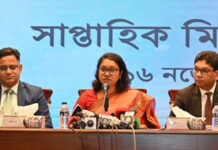Report based on incorrect information: home minister
Extrajudicial killings and forced disappearances, the killing of secular bloggers and others by groups espousing extremist views, some restrictions on online speech and the press, were most significant human rights problems for Bangladesh, said the latest report of the US Department of State.
Early and forced marriage and gender-based violence, and poor working conditions and labor rights, were also in the list of human rights problem, said the United State Country Reports on Human Rights Practices 2015 released on Thursday.
‘Information, based on which US Department of State prepared the report, was not correct,’ home minister Asaduzzaman Khan told New Age Friday evening, when his comment was sought on the finding that extrajudicial killings exist in the country.
While talking with reporters in the morning he said ‘no forms of crossfire or extrajudicial killings take place in Bangladesh’.
Other human rights problems included torture and other abuse by security forces, arbitrary arrests and detentions, weak judicial capacity and independence, and lengthy pretrial detentions, the report said.
‘Weak regard for the rule of law not only enabled individuals, including government officials, to commit human rights violations with impunity, but also prevented citizens from claiming their rights.’
‘The government took limited measures to investigate and prosecute cases of abuse and killing by security forces’ it said.
Authorities infringed on citizens’ privacy rights. Politically motivated violence and intraparty violence remains a serious problem and official corruption also remains a problem.
The media and local and international human rights organizations reported ‘the government or its agents committed numerous arbitrary or unlawful killings’ the report said.
The government neither released statistics on total killings by security personnel nor took comprehensive measures to investigate cases, despite previous statements by high-ranking officials that the government would show ‘zero tolerance’ and fully investigate all
extrajudicial killings by security forces.
In the few instances in which the government brought charges, those found guilty generally received only administrative punishment, but at least one significant case remained pending at year’s end.
‘Some members of the security forces acted with impunity,’ it said.
‘Suspicious deaths occurred during raids, arrests, and other law enforcement operations. Often security forces claimed they took a suspect in custody to a crime scene or hideout late at night to recover weapons or identify conspirators and that the suspect was killed when his conspirators shot at police’.
Human rights groups and media reported that multiple disappearances and kidnappings, some committed by security services, continued, especially in the period following the election anniversary violence. The government made limited efforts to prevent or investigate such acts.
‘Recent elections were marred by tampering and an opposition boycott’ said the report adding that the main opposition party boycotted the January 2014 parliamentary elections, leaving more than half of all seats uncontested and many more only nominally contested.
Because there were few contests, many voters were unable to exercise their choice.
The report said that, the April 28 Dhaka and Chittagong municipal elections, according to multiple sources, were marred by vote rigging, intimidation, and violence.
The December 30 local elections were preceded by months of arrests and other actions against opposition political figures. Polling was largely free and fair, with observers reporting irregularities in approximately 8-12 percent of polling places.
Source: New Age









